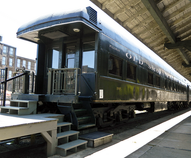A. Kingsley and Laura Myrtle Harkness Macomber
- Don Schueler
- May 31, 2023
- 4 min read
Updated: Aug 30



Myrtle was born in Kansas in 1877, the daughter of Lamon V. Harkness. She developed a passion for horses living and working at Walnut Hall Farm, her father's nationally renowned facility in Kentucky. In 1899, in New York, she married the adventurous A. Kingsley "King" Macomber, of Pasadena, California. She was 22 and he was 25. They lived initially in Pasdena at 1707 S. Orange Grove Blvd.

They built the Rancho Cienega de Los Paicines and invested large amounts of money in running it as a stud farm and cattle ranch. After 1915, as they became more passionate about thoroughbred breeding and racing, they moved to France, buying the Chateau Vanderbilt at Carrières-sous-Poissy. At that point, there were many from American society circles living in Paris. They spent most of their time there until Macomber died in 1955.
Noted sportsman and horse breeder, A. K. Macomber, died in Paris on Oct. 5, 1955, leaving an estate of $16,084,597. He bequeathed more than $900,000 to relatives, friends, and employees and his remaining estate to his widow, Mrs. Myrtle Harkness Macomber. So ended the final chapter in the long and happy life of Abraham Kingsley "King" Macomber.
In Monte-Carlo at Hôtel de Paris, Myrtle met Ilhamy Hussein Pacha, a colorful exile from the Egyptian Royal court who was 25 years younger than she was, and they were married in 1960.



Myrtle died just two years later, without children by either marriage, leaving almost the entirety of her fortune to her widower. While she was only married to Ilhamy for two years, she was interred in Nice, France along with him. King Macomber is interred in Myrtle's family mausoleum, the Lamon V. Harkness mausoleum at Woodlawn in Bronx, NY.
A. Kingsley "King" Macomber

Abraham Kingsley "King" Macomber was born in Morristown, N.J., on March 7, 1875, the second of three sons of Dr. Henry Kirke Macomber and Amelia Collerd Macomber. When King was only 9 years old, the family moved to Pasadena, Calif., where his father established his medical practice. With friend Russell Burnham (later, founder of the Boy Scouts) he traveled to Africa in 1894 to help map the area that would become known as Rhodesia. While the trip was successful they were caught up in native disputes and held under siege for two months before being rescued by the British Army. He left Africa for London, and after a time there returned to the United States. The young couple maintained residences on both coasts, but King's business interests were mostly in California. He became a founding partner of the Los Angeles Trust Co. in 1902 and expanded it into a multi-bank empire and engaged in early oil exploration. When he bought a cattle breeding operation called Rancho Cienega in Paicines, Calif., in 1906, he invested heavily in a large new home and stables and introduced the breeding of thoroughbred horses into the operation.
His racehorse business continued to grow until federal legislation in 1911 banned pari-mutuel betting. Macomber and some other breeders moved their operations to England and France. The Macombers moved back to the States in 1915 as World War I escalated. Although the ban on gambling was lifted, racing was limited by the U.S. entry into the war.
With the war over, King Macomber expanded his operations in both Kentucky and California. The racing world was shocked in September 1920 when it learned that, upon the death of William K. Vanderbilt, Macomber had purchased Vanderbilt's complete racing stable in France for $2 million. The package included the Vanderbilt chateau 20 miles outside Paris and a stable of 38 prized brood mares, four stallions, and 52 younger yearlings and foals.
His horses were running well in the States with six of them entering the Kentucky Derby over a period of years. Star Hawk ran second in 1916 and War Cloud placed fourth in 1918. He won a number of other important American races, including the Travers Stakes, the Suburban Handicap, and the Withers Stakes.
He was also winning major races in France and England. His most famous colt, Parth, won the Prix de l'Arc de Triomphe in 1923 and Gold Bridge won back-to-back King's Stand Stakes at Royal Ascot in 1933 and 1934.
Although he was hailed as the undisputed dean of American society in Paris, the horse racing circuit in the States was also important to the Macombers. For about six decades no other possession(other than a yacht) so identified both rich and famous as a private Pullman car. During that time, the Pullman Company provided some 450 private and business cars at prices ranging from $50,000 in the 1870s to $350,000 for Barbara Hutton's Curley Hut in 1931.
By 1915, the Macombers felt the need for their own private railroad car and chose the Pullman Company to provide it. The Seminole was delivered to their staff in Palm Beach, Fla. The deluxe car had three large staterooms, a room for Myrtle's personal maid, a kitchen, a dining area, and a room for the crew.
King Macomber now needed to make an appearance on the correct private car tracks and at the right season of the year. A typical year would often begin in Palm Beach until February, then to Louisville for the Derby in early May, on to Pimlico in Baltimore for the Preakness in mid-May, and to New York for the Belmont Stakes in June. After the Travers Stakes in Saratoga, N.Y., they proceeded to Del Monte on the Monterey Peninsula in California in autumn,
By 1927, Macomber acquired another token of his success – a new yacht built in Southampton, England, at a cost of $400,000, called Crusader. At 175 feet long with two 400-horsepower diesel engines, the Crusader was the largest private yacht constructed in England since the war. It was designed as a floating home, a nest of unexpected cabins and staterooms, each one beautifully decorated with hidden features for the comfort and pleasure of the owners and their guests.






























Comments